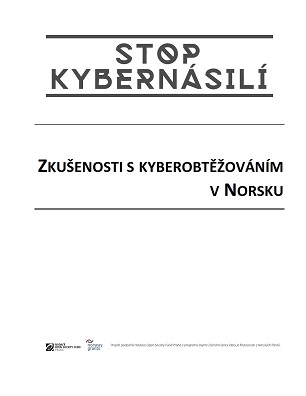
We kindly inform you that, as long as the subject affiliation of our 300.000+ articles is in progress, you might get unsufficient or no results on your third level or second level search. In this case, please broaden your search criteria.

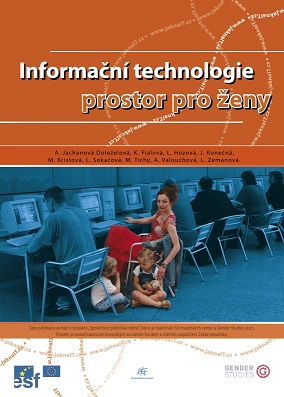
Vážené čtenářky, vážení čtenáři, v rukou právě držíte jednu z prvních publikací o informačních a komunikačních technologiích (ICT) a ženách v České republice, kterou pro Vás společně připravily Gender Studies, o.p.s. a Síť mateřských center. Najdete v ní informace o tom, co vlastně ICT jsou a proč jsou v současnosti skloňovány ve všech pádech. Představíme Vám také jejich využívání v praxi neziskových organizací i fi rem. ICT totiž velkou měrou přispívají ke slaďování osobního a pracovního života – právě ony umožňují pracovat z domova a přitom zůstat v úzkém kontaktu s kolegy a kolegyněmi v práci a předávat všechny potřebné informace a dokončené úkoly včas. Počítač a internet také otevřely nový prostor pro rozvoj podnikání. Určitě jste si již někdy vybrali a objednali zboží v internetovém obchodě. Je to levnější a pohodlné. Pohodlné může být i vaše podnikání po internetu – pracujete z domova a volíte si pracovní dobu podle vlastních potřeb. I na toto téma se zaměřuje jedna z kapitol publikace: navíc Vám přináší základní informace o evropských strukturálních fondech, odkud můžete získat fi nanční zdroje pro podnikání. Věřím, že Vás publikace zaujme a naleznete v ní nové pohledy na trh práce a podnikání v České republice.
More...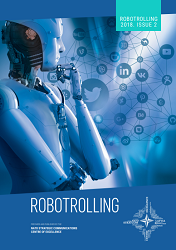
Anonymous users stole the show this quarter. Never before have we observed such high levels of activity from anonymous accounts. At the same time, bot activity in Russian-language conversations about NATO activity in the Baltics and Poland has emerged from its winter slumber. In the wake of the Skripal poisonings in the UK in March, Russian-language bot and anonymous activity about NATO more than doubled. Mentions of NATO on VK, in contrast, have been stable and declining during the whole period. Social media companies are working to end platform misuse. But malicious activity is evolving. Today, anonymous accounts are dominating the conversation. These accounts are either operated manually, or they have become advanced enough to fool human observers. The responses from open and free societies to the problem of online malicious activity have neither been strong enough, nor consistent enough. Figures presented in this issue reveal a disparity between the conversation quality in English and Russian-language spaces. Currently, the Russian-language conversation about NATO in the Baltics and Poland has six times the proportion of content from bot and anonymous accounts. As Twitter has taken steps to remove bots, the disparity has only widened. We assess that 93% of Russian-language accounts in our dataset are operated anonymously or automatically. In no way does this conversation mirror opinions of citizens. Journalists, policy makers, and advertisers take note!
More...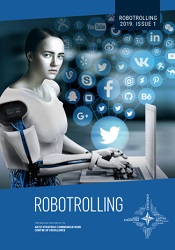
This report presents top-level findings from the first research project to systematically track and measure the scale of inauthentic activity on the Russian social network VK. On VK, a vocal core consisting of loyal news media, pro-Kremlin groups, and bots and trolls dominates the conversation about NATO. The volume of material from this core group is such, that overall genuine users account for only of 14% of the total number of messages about NATO in the Baltic States and Poland. The spread of demonstrably fake content can offer a starting point for measuring how social media manipulation impacts genuine conversations. In the case of one story about a fictitious Finnish blogger, our algorithm estimates that at least 80% of users who shared the fake story were authentic. This quarter, messages appeared in more than 2 000 different group pages on VK. Setting aside messages from group pages, 37% of VK posts came from ‘bot’ accounts—software that mimics human behavior online. This level of activity is comparable to what we have seen on Russian-language Twitter. Unlike on Twitter, where the vast majority of human-controlled accounts are operated anonymously, on VK most accounts are likely to be authentic. Western social media companies have belatedly taken an active role in reducing the reach of the Kremlin’s social media manipulation efforts. However, it remains hard for researchers to evaluate the effectiveness of these measures on platforms such as Facebook and Instagram. In this context, VK offers a cautionary view of a network with minimal privacy, regulation, and moderation.
More...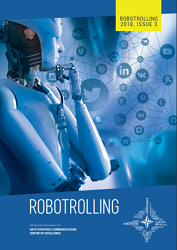
President Trump’s whirlwind tour of Europe in July provoked ferocious discussion about NATO on social media. Anonymous human-controlled English-language accounts, expressing positions in support of or in opposition to the US President, dominated online conversations. Compared to the levels observed in the Spring issue of Robotrolling, the volume of English-language messages has more than doubled. The increasing proportion of anonymous accounts active during key political moments indicate that anonymity is being abused to cloak manipulation on social networks. We call on social media companies to keep investing in countering platform misuse. The social media companies Reddit and Twitter have released lists of accounts identified as originating from the notorious St Petersburg ‘troll factory’—the Internet Research Agency (IRA). In this issue, we present the first quantitative analysis comparing English- and Russian-language posts from these accounts. The IRA bombarded citizens in Russia and its neighboring states with pro-Kremlin propaganda. For English, fake accounts posed as Trump supporters, and argued both sides of the Black Lives Matter controversy. Russian-language material closely echoed and amplified the narratives popularized by Russian state-media. Amongst the accounts identified by Twitter, 26 also posted about NATO in the Baltics and Poland. Our algorithm correctly identified 24 of these as bot accounts. The other two accounts were anonymous human-controlled (troll) accounts.
More...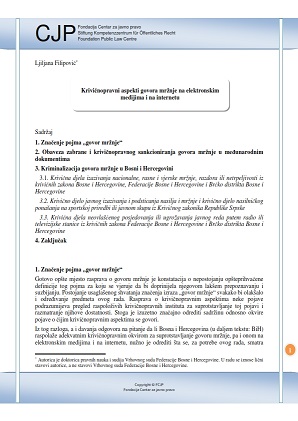
The paper considers some criminal law aspects of “hate speech” on electronic media and internet. After the definition of meaning of the term “hate speech” provided for the needs of the paper, and a review of obligations of the member States concerning prohibition and criminalization of hate speech in certain international legal documents, the paper also gives a review of the manner and scope of criminalization of hate speech in the criminal codes in force in BiH. In addition to an analysis of the principal legal elements of the related criminal offenses, the paper pays a special attention to the preconditions which must be satisfied in order that a conviction for the criminal offense of hate speech is not in violation of the right to free expression as one of the fundamental human rights. The paper also refers to the responsibility of journalists and media for hate speech and its spreading, as well as the responsibility of mediators – service providers for hate speech of others.
More...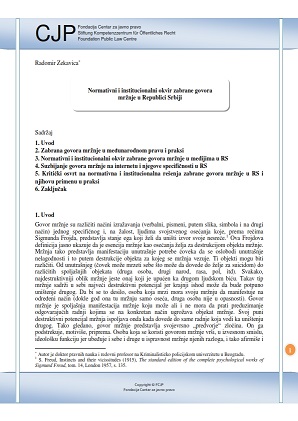
After analyzing the prohibition of hate speech in international law and practice, the author analyzes the normative and institutional framework for hate speech prohibition in Serbia. The analysis points to valid legal solutions to this prohibition, regulations of regulatory bodies that are responsible for combating hate speech in print and electronic media and the Internet, and then provides an overview of institutional mechanisms of protection against hate speech. After that, the author gives a critical overview of the functioning of the normative-institutional framework for the prohibition of hate speech and points to the key problems, first of all: the problem of media freedom, the high degree of non-recognition of the essence of discrimination and hate speech among representatives of the public authorities, the problem regarding the functioning and independence of regulatory bodies, but also the judicial system in general. Political discourse in Serbia is burdened with the spirit of intolerance and rhetoric that often contains hate speech. The fact that pro-government media often appear as actors of such rhetoric is worrying, as it points to the readiness of the public authorities to promote a critical dialogue that is the premise of a healthy democratic society.
More...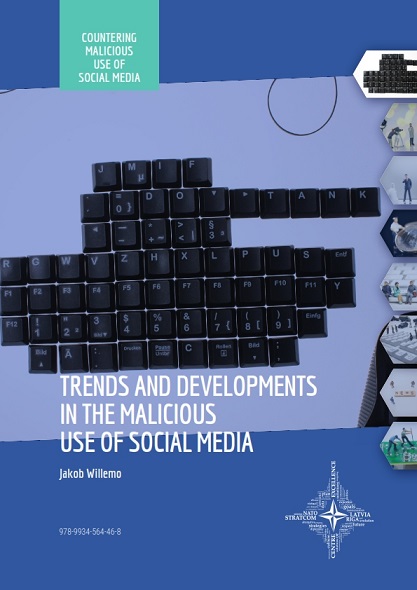
The malicious use of social media is a widespread phenomenon, targeting individuals, public opinion, and in some cases even the functioning of the state. In recent years, social media platforms have been abused by foreign governments, private companies, and individuals to influence the outcomes of democratic elections and to undermine public trust in the societies in which we live. Today, social media platforms are manipulated by malign actors in order to pursue their political and military goals. In other words, social media platforms have developed into an effective tool for waging information warfare. Although information warfare is nothing new, social media platforms offer a cheaper, more efficient, and less demanding stage for influencing larger numbers of people than ever before. While the social media platforms are conduits facilitating the free passage of information, the companies that own them are active participants wielding significant influence over what takes place in the social media space and, increasingly, over how we communicate, interact, and socialise in the 21st century.
More...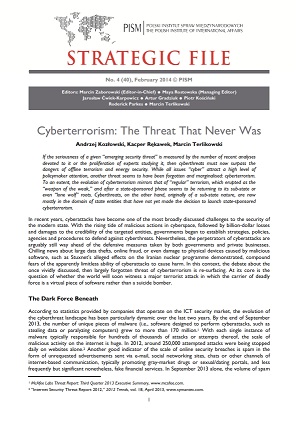
If the seriousness of a given “emerging security threat” is measured by the number of recent analyses devoted to it or the proliferation of experts studying it, then cyberthreats must now surpass the dangers of offline terrorism and energy security. While all issues “cyber” attract a high level of policymaker attention, another threat seems to have been forgotten and marginalised: cyberterrorism. To an extent, the evolution of cyberterrorism mirrors that of “regular” terrorism, which erupted as the “weapon of the weak,” and after a state-sponsored phase seems to be returning to its sub-state or even “lone wolf” roots. Cyberthreats, on the other hand, originally of a sub-state nature, are now mostly in the domain of state entities that have not yet made the decision to launch state-sponsored cyberterrorism.
More...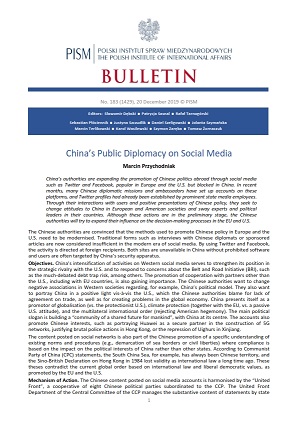
China’s authorities are expanding the promotion of Chinese politics abroad through social media such as Twitter and Facebook, popular in Europe and the U.S. but blocked in China. In recent months, many Chinese diplomatic missions and ambassadors have set up accounts on these platforms, and Twitter profiles had already been established by prominent state media employees. Through their interactions with users and positive presentations of Chinese policy, they seek to change attitudes to China in European and American societies and sway experts and political leaders in their countries. Although these actions are in the preliminary stage, the Chinese authorities will try to expand their influence on the decision-making processes in the EU and U.S.
More...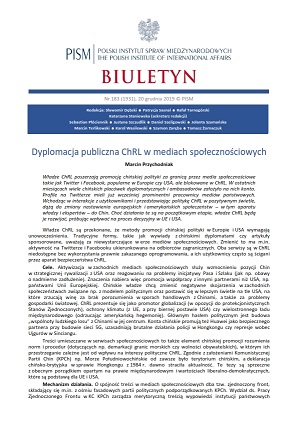
Władze ChRL poszerzają promocję chińskiej polityki za granicą przez media społecznościowe takie jak Twitter i Facebook, popularne w Europie czy USA, ale blokowane w ChRL. W ostatnich miesiącach wiele chińskich placówek dyplomatycznych i ambasadorów założyło na nich konta. Profile na Twitterze mieli już wcześniej prominentni pracownicy mediów państwowych. Wchodząc w interakcje z użytkownikami i przedstawiając politykę ChRL w pozytywnym świetle, dążą do zmiany nastawienia europejskich i amerykańskich społeczeństw – w tym aparatu władzy i ekspertów – do Chin. Choć działania te są na początkowym etapie, władze ChRL będą je rozwijać, próbując wpływać na proces decyzyjny w UE i USA.
More...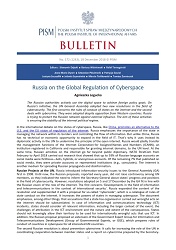
The Russian authorities actively use the digital space to achieve foreign policy goals. On Russia’s initiative, the UN General Assembly adopted two new resolutions in the field of cybersecurity. The first concerns the rules of conduct of states on the internet and the second deals with cybercrime. They were adopted despite opposition from Western countries. Russia is trying to protect the Russian network against external influence. The aim of these activities is ensuring the stability of the internal political regime.
More...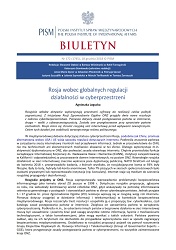
Rosyjskie władze aktywnie wykorzystują przestrzeń cyfrową do realizacji celów polityki zagranicznej. Z inicjatywy Rosji Zgromadzenie Ogólne ONZ przyjęło dwie nowe rezolucje z zakresu cyberbezpieczeństwa. Pierwsza dotyczy zasad postępowania państw w internecie, druga – walki z cyberprzestępczością. Zostały one przegłosowane przy sprzeciwie państw zachodnich. Rosja stara się chronić rosyjską sieć internetową przed wpływami zewnętrznymi. Celem tych działań jest stabilność wewnętrznego reżimu politycznego.
More...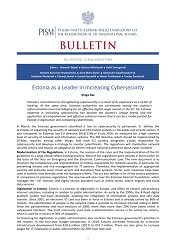
Estonia's commitment to strengthening cybersecurity is a result of its experience as a victim of hacking. At the same time, Estonian authorities are consistently raising the country's informatisation level and lobbying for an effective digital single market in the EU. For Estonia, expertise in increasing cybersecurity has become the country’s unique brand, and the application of comprehensive and effective solutions means that it can be a model partner for Poland in digitisation and combating cyberthreats.
More...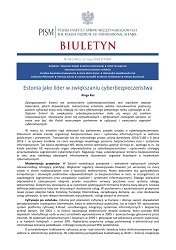
Zaangażowanie Estonii we wzmocnienie cyberbezpieczeństwa jest wynikiem ataków hakerskich, jakich doświadczyła. Jednocześnie estońskie władze konsekwentnie podnoszą poziom cyfryzacji kraju oraz lobbują na rzecz efektywnego jednolitego rynku cyfrowego w UE. Dążenie Estonii do zwiększania cyberbezpieczeństwa stało się wręcz jej znakiem rozpoznawczym. Stosowanie przez nią kompleksowych i efektywnych rozwiązań sprawia, że może ona być dla Polski wzorcowym partnerem w cyfryzacji i zwalczaniu zagrożeń cybernetycznych.
More...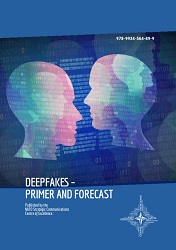
“Artificial intelligence”—the broad category of study exploring the creation of intelligent machines—has enjoyed a resurgence in the last decade, driven by a combination of research breakthroughs, a massive expansion in access to data, and advances in computational hardware. New developments and applications have captured the imagination of policymakers and the public at large, inspiring both hopes and fears around artificial intelligence and its future prospects. Among the many areas of concern around the technology, perhaps one of the most widely discussed has been the threat posed by “deepfakes”: synthetic audio, images, and video generated with artificial intelligence. Deepfakes are often strikingly realistic and sometimes challenging to distinguish from the genuine article. Artificial intelligence has been used to produce deepfakes depicting prominent political figures from Donald Trump to Vladimir Putin saying a variety of things they never in fact said.
More...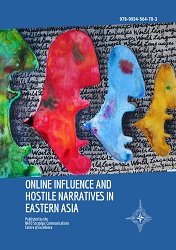
Eastern Asia — which we will define as including East and Southeast Asia — is a region of increasing geopolitical competition with many racial, cultural and societal fractures. With the rapid expansion of inexpensive internet access, these fractures and tensions mean that many states in the region are both vulnerable to, and a source of, hostile information activities that are being used to achieve strategic goals both inside and outside the region. This report documents examples of hostile information activities that have originated in Eastern Asia and have been targeted in the following countries: • Taiwan; • The Hong Kong-based protest movement; • West Papua; • The Philippines.
More...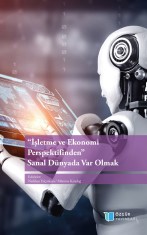
Technological developments that have entered our lives in the past 50-60 years are evolving in a way that will affect the social and economic structuring radically. Especially in the Covid-19 crisis that shook the whole world, the biggest support that ensures the continuation of the system has come from technology. After a very short time, a new intertwined with a virtual world. It is obvious that there will be an economic and social organization. The footsteps of this transformation are heard, as always, when businesses adopt the process and contribute. In this book, the current changes in economy, finance and marketing have been examined and it has been tried to explain what can be experienced with Metaverse, which is expected to create a great transformation in every moment of our lives in the coming period, and what kind of economic structuring may be in question. We would like to thank all of our colleagues who supported our book both with their writings and by sharing their academic knowledge and experience, and we hope that our book will contribute to the academic literature in this marriage process where technology and businesses are getting ready to live.
More...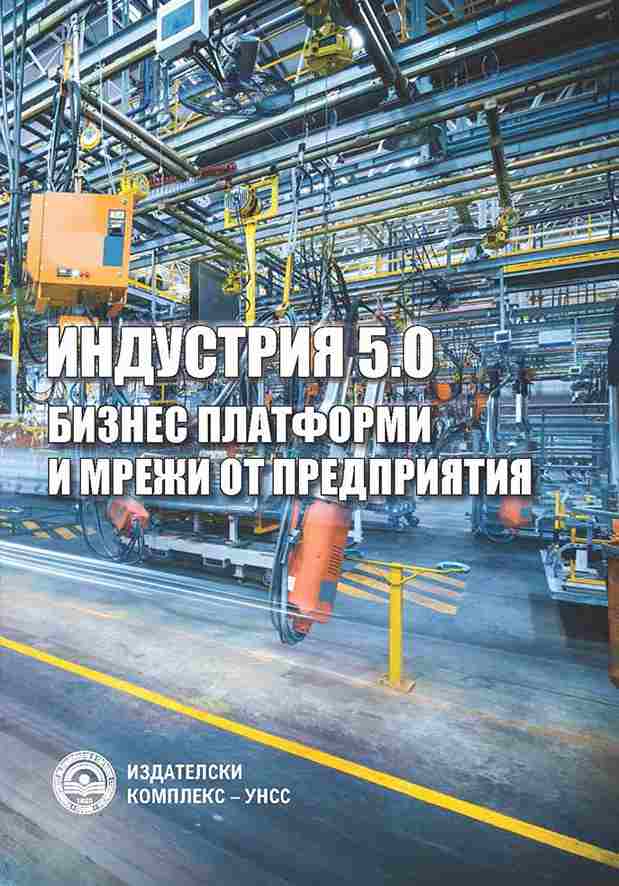
The study of the development of business platforms for information sharing is an issue of increasing importance in recent years as there has been a huge increase in the amount of information shared, including photos and video materials, between individual individuals. At the same time, business platforms are still accepted by companies as the "forbidden fruit" that everyone wants for themselves but not to share. The importance of social business platforms is justified by the fact that this issue covers the intersection of two main fields, especially important for a modern, economically rational society: knowledge, as permanent and significant information, which is acquired and used in making important economic and management decisions, on the one hand; information dissemination technologies, using modern tools and approaches, for example, social networks, on the other hand. Formulated in this way, the problem of combining knowledge as an approach to management of modern economic and social systems and tools, from a technical point of view, has not been the subject of more in-depth research either in Bulgaria or around the world. The significance of the researched problem is also expanded in the search for the combination of two different approaches to a new social and economic phenomenon: dissemination of information between individual social units through the sharing of knowledge, experience, photos, and video information. The liberalization of world markets, the dynamic development of new technologies, and the rapid growth of resources devoted to training and innovation turn knowledge into a basic production resource and a critical factor for the success of individual companies and countries, and the "knowledge economy" becomes a key word. Thus, with the development of information technology and its tools, we are witnessing a real revolution in the creation, distribution, accessibility, and use of knowledge. Knowledge has become the most valuable asset, with its own rules of existence and management. The more knowledge is added to a product, the more valuable it becomes. The conducted literary and applied research shows that both the attitude and the motivation to join business social networks depend on the use of Internet techniques and the digitalization of business. However, the relationship found and the real dependence are not so clear and/or so strong. The explanation is that social business networks are used similarly to traditional social networks. This leads to the fact that Bulgarian managers are too skeptical about the benefits of social business networks (or because of a lack of trust or unwillingness to share information or to be part of the information community), since many of them are offline: there are no emails, no corporate pages, no network profiles, etc. That being said, the real business digitization effort is the translation of business excellence from real business to the digital world. In summary, social business networks should be accepted as the natural evolutionary development of business digitalization. Accordingly, businesses must decide not whether to be part of these emerging global business networks, but how to join and which business networks to join, so as to derive maximum benefits for their future development.
More...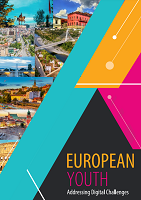
Following global trends, social media has become an instrumental part of daily life for most Albanians. Even before the COVID-19 pandemic, it was a primary means for social communication and receiving information on current affairs. Moreover, since the outbreak of the pandemic, social media has cemented its position as an irreplaceable aspect of people’s personal and professional lives. While it is wonderful that the internet allows education, business, and daily life to continue, there are some challenges to such dependency on social media. For example, disinformation spreads six times faster through social media channels than actual news, and social media platforms create opportunities for unsupervised communication, which can lead to harassment, abuse, and blackmail.
More...